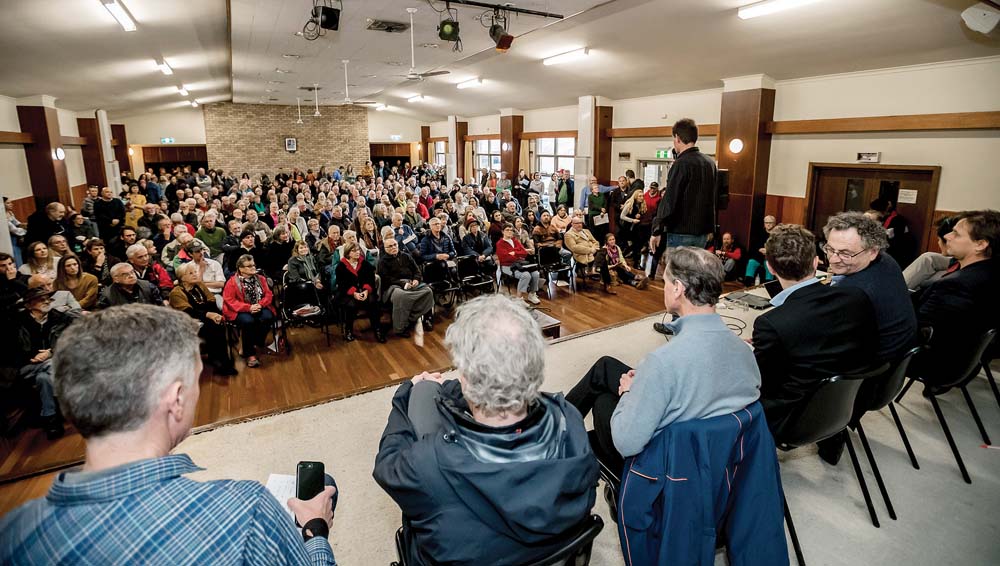
EXPERTS are being asked for ways to control mosquitoes on the southern Mornington Peninsula using “alternative approaches to spraying” that will not harm the environment.
The move by Mornington Peninsula Shire councillors follows a packed public meeting on Saturday which highlighted residents’ concerns over a spraying program planned for October as part of studies into the flesh-eating Buruli ulcer.
The spraying program will now be put on hold until more is known about the effect its chemicals will have on the environment.
“The mood of the meeting was that we all want to work towards eradicating Buruli ulcers on the peninsula, but do not wish to be the guinea pigs in a scientific trial of questionable value,” Paul Saunders said.
Mr Saunders, who organised the meeting at Rye civic hall with fellow members of the peninsula branch of The Greens, Kelvin Stingle and Roslyn Browning, said: “We stepped in where others had failed and created an information sharing event that the local community desperately needed.”
The spraying in October of selected residential areas by scientists studying the spread of the ulcer may be abandoned or modified depending on the outcome of the shire’s search for “alternative approaches”.
A motion by Cr Simon Brooks at Tuesday’s (13 August) meeting said council, after receiving that advice, will “listen to the community’s concerns and act accordingly”.
The mayor Cr David Gill told the estimated 300 people at Saturday’s meeting that $1.5 million might be needed to reduce the number of mosquitoes without spraying.
Cr Gill said alternatives could include mosquito traps, an intensive public education campaign to reduce possible mosquito breeding grounds and use in water of a chemical that would kill only mosquito larvae.
Cr Gill told The News it was now clear that there had been little or no research into the effects of spraying on the environment.
The federal government has already committed $3.9 million towards fighting the Buruli ulcer and the shire will ask Flinders MP Greg Hunt, who is also the health minister, for more money after it decides what actions should be taken.
After the meeting Mr Hunt repeated his earlier contention “that the shire has and maintains full authority over actions undertaken in its municipality”, including the Buruli study (“Public may decide ulcer study’s future” The News 6/8/19).
“My advice to the meeting and the council is that they may want to consider moving to an opt-in program,” he said.
Under the terms of the announced spraying program residents can opt out, so that their properties are not involved.
“It was also good [at the meeting] to speak to locals about how to better educate physicians and diagnosticians on the ulcer and I look forward to working with the Victorian government and Victorian Department of Health and Human Services to further improve the information the state has and will make available,” Mr Hunt said.
Councillors were caught off guard last month when they found out that three streets in Rye had already been sprayed with chemicals as part of the Buruli studies (“Ulcer study ‘now a trial’ – mayor” The News 31/7/19).
The shire had previously appeared to be a minor player in the Buruli study and the shire officers involved did not tell councillors about the spraying conducted by the Victorian Department of Health and Human Services, the Doherty Institute, Barwon Health, Austin Health, the CSIRO, Agriculture Victoria and the University of Melbourne.
Beekeeper Will Holmes told the public meeting that he threw away about $2000 worth of honey produced by colonies of bees he kept several streets away because he feared chemical contamination from the spraying.
Background information provided to councillors this week said the planned spraying of “pesticides, herbicides, insecticides or other” in October was aimed at finding out how to manage mosquito populations and “one strong hypothesis [of] a link between some types of mosquito, possums and the ulcer”.
However, the background paper stated that the shire was unaware of “any parallel examination of the impact that this spraying will have on the wider ecosystem”.
“The shire is also unaware of any significant public consultation on the use of spraying for this trial that would ensure our community enter into this study with all the relevant information and have had their very real concerns considered properly,” the paper stated.
First published in the Southern Peninsula News – 13 August 2019